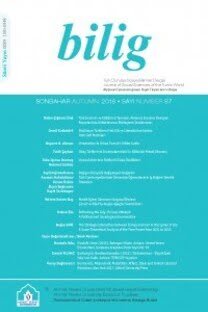The European Union's Role in Turkey's Social Transformation
Türkiye'nin Toplumsal Değişiminde Avrupa Birliği'nin Rolü
___
AB BAKANLIĞI (Ministry of EU Affairs)http://www.ab.gov.tr/index.php?p=6/ (Accessed: 20 June 2015)
Akçay, Belgin (2008). "Avrupa Birliği'nin Ekonomik Kriterleri ve Türkiye (The European Union Economic Criteria and Turkey)". Maliye Dergisi 155 (June-December): 11-38.
Altuntaş, Zeynep ve Özgür Korkmaz (2011). Rakamlarla Türkiye Ekonomisi (Basic Indicators in Turkish Economy). İstanbul: İstanbul Ticaret Odası Yay.
ANKARA ANLAŞMASI (Ankara Agreement),http://www.abgm.adalet. gov.tr/sablon/yenisablon/pdf/ank_anlasmasi.pdf/ (Accessed: 3 July 2015)
Baç, Meltem Müftüler (2002). "Turkey in the EU's Enlargement Process, Obtacles and Challenges". Mediternanian Politics 7 (2): 79-92.
-------------------------- and Yaprak Gürsoy (2010). "Is There a Europeanization of Turkish Foreign Policy? An Addendum to the Literature on EU Candidates". Turkish Studies 11 (3): 405-427.
Bozkurt, Gülnihal (1991). "Atatürk'ün Hukuk Alanında Getirdikleri ( Law Reforms in the Ataturk Era)". Atatürk Araştırma Merkezi Dergisi 8 (22): 1-6.
Börzel, Tanja and Didem Soyaltın (2012). "Europeanization in Turkey- Searching a Concept to Its Limit?". KFG Working Paper 36 (February): 1-22.
Dinan, Desmond (2003). Ever Closer Union-An Introduction to European Integration. Palgrave, London.
Dover, Robert (2007). "The EU's Foreign, Security and Defence Policies". The European Union Politics. Ed. Michelle Cini. Oxford University Press, New York.
Erçınar, Emin ve Erdal Tanas Karagöl (2011). "Türkiye'de Yabancı Sermaye Yatırımları (Foreign Direct Investment in Turkey)". SETA Analizi. http://arsiv.setav.org/ups/dosya/65109.pdf
Esmer, Ahmet Şükrü ve Oral Sander (1989). "İkinci Dünya Savaşında Türk Dış Politikası (Turkish Foreign Policy in the Second World War)". Olaylarla Türk Dış Politikası. Ankara: Alkım Kitabevi.
Hale, William. "Human Rights, European Union and Turkish Accession Process". Turkish Studies 4 (1): 107-126.
KATMA PROTOKOL (Additional Protocol)
http://www.ab.gov.tr/files/ardb/katma_protokol.pdf/ (Accessed: 15 July 2015)
Kapusuz, Fadime (2006). Avrupa Birliği Uyum Sürecinin Türk Ekonomisi Üzerindeki Etkileri (1961-2006) - (The EU Harmonization Proces and Turkish Economy (1961-2006). Yüksek Lisans Tezi. Isparta: Süleyman Demirel Üniversitesi.
Karacan, Ali Naci (1971). Lozan. İstanbul: Milliyet Yay.
Karakaya, Naim and Hande Özhabeş (2013). "Judicial Reform Packages: Evaluating Their Effects on Rights and Freedoms". Tesev Democratization Program Policiy Report. İstanbul: Tesev Publications.
Kerluk, Rıdvan (2002). Avrupa Birliği ve Türkiye (The European Union and Turkey). 6th Edition. İstanbul: Beta Yay.
Kirişçi, Kemal (2009). "The Transformation of Turkish Foreign Policy: The Rise of the Trading State". New Perspectives on Turkey 40: 29-57.
Kramer, Hans (2006). "Turkey and the EU: The EU's Perspective". Insight Turkey 8 (4): 24-32.
Kroening, Matthew, M. Mc Adam and S. Weber (2010). "Taking Soft Power Seriously". Comparative Strategy 29 (5): 412-431.
Mergil, Orhan. "Kopenhag Ekonomik Kriterleri ve Türkiye'nin Uyum Süreci (Copenhagen Economic Criteria and Turkey's Harmonization Process". Ankara Çalışmaları Dergisi (Prof. Ahmet Gökdere'ye Armağan) 5 (2): 91-102.
Nye, Joseph (1990). Boun to Lead: The Changing Nature of American Power. New York: Basic Books.
--------------- (2004). Soft Power: The Means to Success in World Politics. New York: BBS Public Affairs.
Oran, Baskın (2001). Türk Dış Politikası (Turkish Foreign Policy (1919- 1980)). İstanbul: İletişim Yay.
Öniş, Ziya (2002). "Turkish Modernization and Challenges For the New Europe". Perceptions (Autumn): 5-38.
Özcan, Mehmet (2001). "Türkiye-AB İlişkilerinde İnsan Hakları -Human Rights in Turkey-EU Relations". Polis Bilimleri Dergisi 2(5-6): 87- 96.
Sayarı, Sabri (2003). "The United States and Turkey's Membership in the European Union". Turkish Yearbook International RelationsXXXIV: 168-176.
Tocci, Nathalie (2005). "Europeanization in Turkey: Trigger or Anchor for Reform?". South European Society & Politics 10 (1): 73-83.
Toğan, Subidey (2012). "EU-Turkey Customs Union: A Model for Future Euro-Med Integration". MEDPRO Technical Report. Brussel.
Zucconi, Maria (2006). "Turkey's Vital and Turbulent Road to the European Union". International Spectator 1: 83-94.
RESMİ GAZETE (Official Journal), 17 October 2001, Issue: 24556
- ISSN: 1301-0549
- Yayın Aralığı: 4
- Başlangıç: 1996
- Yayıncı: Ahmet Yesevi Üniversitesi Mütevelli Heyet Başkanlığı
1970'lerde Türk Toplumundaki Sosyal Değişimin Yokuşa Akan Sular Hikâyesindeki Akisleri
Bayraklı, Enes ve Hafez, Farid (Eds.) (2016). European Islamophobia Report 2015. İstanbul: SETA Yay.
Türkiye - Avrupa Birliği Müzakere Sürecinde İlk On Yılın Muhasebesi (2005-2015)
Water-related Tales and Beliefs in Muğla
The European Union's Role in Turkey's Social Transformation
Evli Kadınlar ve Erkekler İçin Psikolojik İyi Oluş Ölçeğinin Türkçe'ye Uyarlaması
